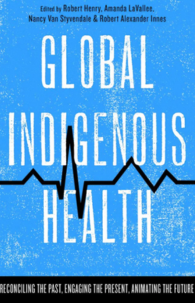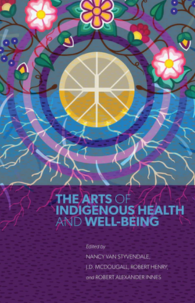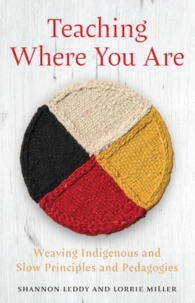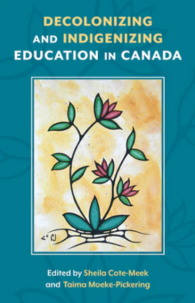 |
Global Indigenous Health
by Robert Henry, Robert Alexander Innes, Amanda LaVallee, Nancy Van Styvendale
Global Indigenous Health: Reconciling the Past, Engaging the Present, Animating the Future is an edited volume by Robert Henry, Métis; Amanda LaVallee, Red River Métis; Nancy Van Styvendale; and Robert Alexander Innes, a member of Cowessess First Nation. Global Indigenous Health discusses how Indigenous peoples globally have a keen understanding of their health and wellness through traditional knowledge systems. In the past, traditional understandings of health often intersected with individual, community, and environmental relationships of well-being, creating an equilibrium of living well. However, colonization and the imposition of colonial policies regarding health, justice, and the environment have dramatically impacted Indigenous peoples’ health.
|
 |
Separate Beds: A History of Indian Hospitals in Canada, 1920s-1980s
by Maureen K. Lux
Separate Beds is the shocking story of Canada's system of segregated health care. Operated by the same bureaucracy that was expanding health care opportunities for most Canadians, the "Indian Hospitals" were underfunded, understaffed, overcrowded, and rife with coercion and medical experimentation.
|
 |
Medicine Unbundled: A Journey through the Minefields of Indigenous Health Care
by Gary Geddes
Gary Geddes turned the investigative lens on his own country, embarking on a long and difficult journey across Canada to interview Indigenous elders willing to share their experiences of segregated health care, including their treatment in the "Indian hospitals" that existed from coast to coast for over half a century.
|
 |
Fighting for a Hand to Hold: Confronting Medical Colonialism against Indigenous Children in Canada
by Samir Shaheen-Hussain, Cindy Blackstock, et al.
Launched by healthcare providers in January 2018, the #aHand2Hold campaign confronted the Quebec government's practice of separating children from their families during medical evacuation airlifts, which disproportionately affected remote and northern Indigenous communities.
|
 |
The Arts of Indigenous Health and Well-Being
by Nancy Van Styvendale
The Arts of Indigenous Health and Well-Being demonstrates the healing possibilities of Indigenous works of art, literature, film, and music from a diversity of Indigenous peoples and arts traditions. Edited by Nancy Van Styvendale, J.D. McDougall, Métis, Robert Henry, and Robert Alexander Innes, a member of Cowessess First Nation, this book will resonate with health practitioners, community members, and any who recognize the power of art as a window, an entryway to access a healthy and good life.
|
 |
Clearing the Plains: Disease, Politics of Starvation, and the Loss of Indigenous Life
by James Daschuk Ph.D, Elizabeth A. Fenn, et al.
Revealing how Canada's first Prime Minister used a policy of starvation against Indigenous people to clear the way for settlement, the multiple award-winning Clearing the Plains sparked widespread debate about genocide in Canada.
|
 |
Structures of Indifference: An Indigenous Life and Death in a Canadian City
by Adele Perry and Mary Jane Logan McCallum
Structures of Indifference examines an Indigenous life and death in a Canadian city and what it reveals about the ongoing history of colonialism.
|
 |
Teaching Where You Are : Weaving Indigenous and Slow Principles and Pedagogies
by Shannon Leddy & Lorrie Miller
Teaching Where You Are offers a guide for non-Indigenous educators to work in good ways with Indigenous students and provides resources across curricular areas to support all students. In this book, two seasoned educators, one Indigenous and one settler, bring to bear their years of experience teaching in elementary, secondary, and post-secondary contexts to explore the ways in which Indigenous and Slow approaches to teaching and learning mirror and complement one another.
|
 |
Decolonizing and Indigenizing Education in Canada
by Sheila Cote-Meek, Taima Moeke-Pickering
Decolonizing and Indigenizing Education in Canada edited by Sheila Cote-Meek, an Anishnaabe-Kwe from the Teme-Augama Anishnabai, and Taima Moeke-Pickering, Maori of the Ngati Pukeko and Tuhoe Tribes from Aotearoa - New Zealand, is an expansive collection exploring the complexities of decolonization and indigenization of post-secondary institutions. Seeking to advance critical scholarship on issues including the place of Indigenous epistemologies, knowledges, curriculum, and pedagogy, Decolonizing and Indigenizing Education in Canada aims to build space in the academy for Indigenous peoples and resistance and reconciliation.
|
 |
21 Things You May Not Know About the Indian Act: Helping Canadians Make Reconciliation with Indigenous Peoples a Reality
by Bob Joseph
Based on a viral article, 21 Things You May Not Know About the Indian Act is the essential guide to understanding the legal document and its repercussion on generations of Indigenous Peoples, written by a leading cultural sensitivity trainer.
|
 |
True Reconciliation: How to Be a Force for Change
by Jody Wilson-Raybould
There is one question Canadians have asked Jody Wilson-Raybould more than any other: What can I do to help advance reconciliation? It is clear that people from all over the country want to take concrete and tangible action that will make real change. We just need to know how to get started. This book provides that next step.
|



















